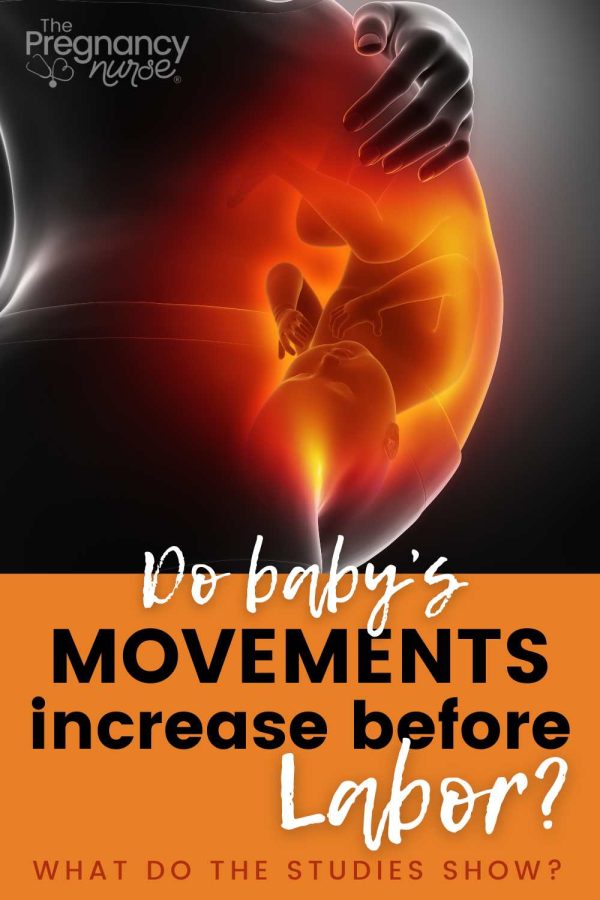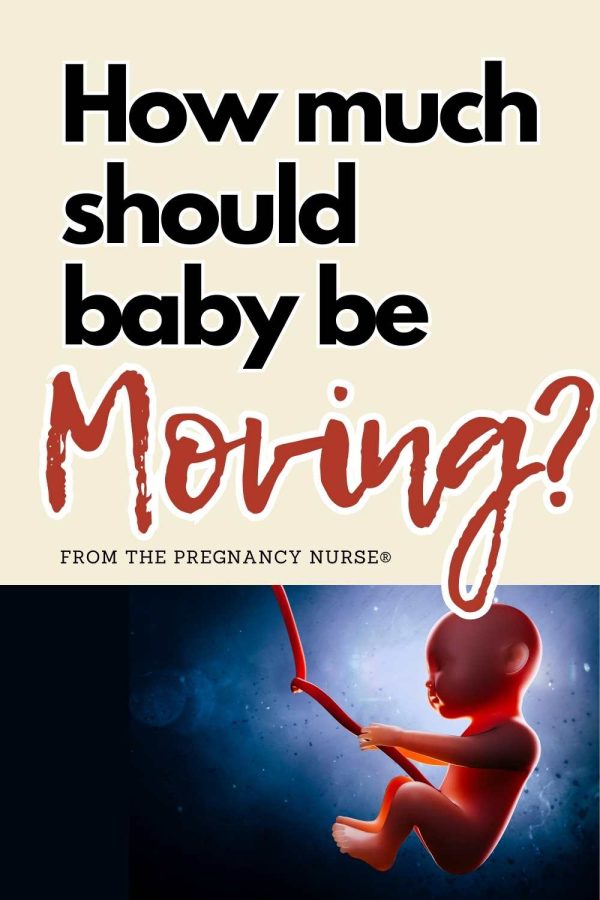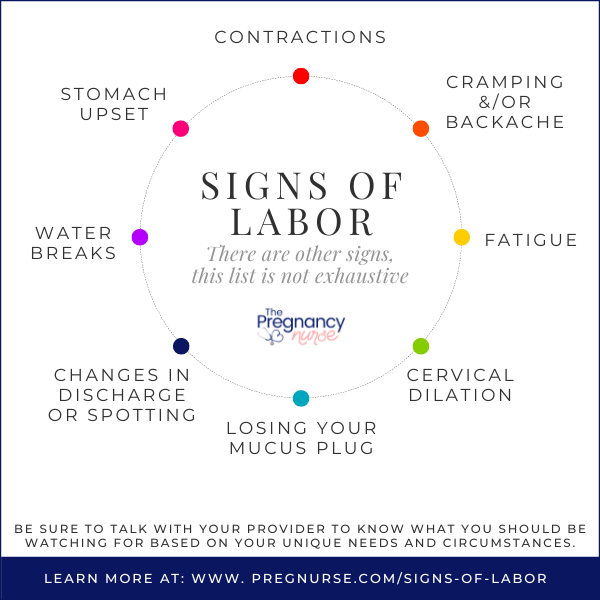👋 I’m so glad YOU are here. Are you looking to also get your partner prepared? This is for BOTH of you. Couples just love it and I know you want to both feel prepared!
Do you notice baby moving more and wonder if it’s a sign of labor? In general baby’s movements don’t drastically change before labor (or even during labor) but there are reasons you may perceive it that way. This article we’ll talk more about baby’ movements and why tracking them can be SO important!

This (or any article on The Pregnancy Nurse) should not be taken as medical advice, this purely educational. Please talk with your provider about your specific needs and circumstances. It’s always a good idea to keep track of your pregnancy progress and any changes that you notice with baby’s movements. If you’re ever concerned about decreased fetal movement or increase of activity, be sure to talk to your doctor or midwife right away.
Fetal movement is your best indicator of fetal well-being. Kick counts is the BEST way to do that (studies prove it) — grab my cheat sheet to make sure you’re doing them right here:
Ok, let’s dive into fetal movement in those last few weeks before your due date.
Is there increased fetal movement before labor?
In my 20 years of experience as a registered nurse in labor and delivery, many do report baby moves more before early labor. I actually can’t find any actual studies on this. It’s hard, because if you’re feeling this, and you’re close to your due date there is a good chance that you will got into labor soon (simply a numbers game). Kind of like how eating eggplant parm will put you into labor.
There are a few reasons why people may feel more movement before labor begins — so let’s keep talking about what you’re feeling.
Or, check out my Youtube video about this too:
Why might I feel more movement before labor?
There are a few reasons why you may feel more fetal movement before labor begins:
A Watched Uterus
You may be taking the time to really think about any contractions or pains that you’re having. When concentrating more on your body you’re also likely to feel more fetal movement. Also, people tend to just have less bodycactivity those last few weeks (for good reason — you’re miserable!), so you just feel more because you’re more still.
As a note — I think people notices this increase even with “false labor” (or braxton hicks) — again, just because they’re “watching their body” more.
Fetal Positioning
As baby gets closer to being born it will shift down into the birth canal (many people call this lightening). It may also rotate. All of these things are changes in their positioning which may mean that you feel it more than you used to. I have a whole post about baby lowering into your pelvis around 37 weeks.
Also, as baby makes the move down into the pelvis they may be moving a bit more as they settle in. Sort of like when you’re trying to find a comfy position in bed you shimmy a bit. 🙂
Cramped Uterus
The uterus is getting stretched to capacity. A uterus that is hitting max capacity is one of the signs your body takes that it’s time to release the oxytocin and go into labor. But, with baby being so cramped you may feel more than you felt before.
And, baby may be pushing into your cervix as well, so you’ll start to feel head movements on that (and they may make your mucus plug dislodge, and you may to start to dilate from this). All of that is normal labor stuff.
Ruptured Amniotic Sac
If your water is broken you’ll feel more of the baby moving. No longer will the amniotic fluid cushion their every move in your womb — you’ll be feeling all those things.
Remember that water breaking can come out as a gush or a trickle, so if you have any question as to if your water is broken please do call your provider.
Hopeful
Towards the end you might start to think/hope everything is a sign of labor. Baby sure seems to be moving more…. maybe labor is coming? I know this hopeful feeling all too well!
Some of you may actually be feeling less movement — so be sure to check out my post on 30 weeks and baby is moving less.
I love being hopeful. I think it’s what gets us through a LOT of pregnancy.
Want to know more 3rd trimester resources — check out these posts:
- Why People Get An Epidural Even When They’re Not Planning On It
- How to Feel Confident Making Choices During Labor
- Normal Daily Fetal Movement – Kick Counts
- The Three Biggest Mistakes Labor Patients Make—And How to Prevent Them
- What to Do If You are in Pain During Pregnancy
If you’re close to labor time — have you gotten your prenatal class in yet? If not, it’s NOT too late — I always recommend learning from an expert << that class only takes a couple of hours. The good news, you’ve got time!
Ok, back to baby movements….
What is the significance of increased baby movement before labor begins?
It could show that baby has lowered into the birth canal (some people say “dropped” but I don’t like to use that word around babies). It is all a very normal flow of labor and baby’s progression into the birth canal as the weeks of pregnancy are finishing.
A sudden increase in fetal movement can mean several things. It could be a sign that labor is approaching, or it could simply be a sign that baby is having an active day and is feeling comfortable inside the uterus.
Most often, in the healthcare community, we’re huge fans of fetal movement — it shows that baby is growing and thriving.
Sudden Increased Fetal Movement
There have been a few studies that showed that sudden BIG changes in fetal movement could be associated with poor outcomes.
This one showed that excessive fetal movements could be associated with a larger baby (also known as LGA — Large for gestational age).
This one, however showed no risk between sudden increased fetal movement and poor fetal outcomes (stillbirth).
If you feel sudden large changes in fetal movement that last longer than a few moments — you may want to call your provider and just see what they think.
Remember, fetal movement is your best indicator of fetal well-being! (this is a big soapbox for me).
If you feel like movements are different, you should call your provider. Kick counts are a great way to track fetal movement — in case you missed it, grab my cheat sheet here:
Don’t miss my super helpful post all about the signs of labor. Great info for pregnancy!
Will baby continue to move during labor?
Most people feel baby’s movement change during labor, but you should still be able to feel your baby move while you are in labor.
Most people can still even feel it with the epidural (although, as you expect, it is different at that point).
So keep making sure that baby is moving well, even right before baby is born (somehow those movements are even more precious because you know they’ll be some of your last ones). Your nurses will ask you during your labor if baby is moving as well. It gives them peace of mind as well.
Speaking of reassuring, knowing what to expect in the labor is the QUEEN of reassurance — so come join me in The Online Prenatal Class for Couples where we prepare you from bump to bassinet for your upcoming birth. I can’t wait to see you in there!
And, if you’re not quite sure you’re ready for that whole thing (but seriously, what are you waiting for????), check out my free class. It’s your first step toward getting in the driver’s seat of your birth.
Sources:
INVEST study Professor Alexander Heazell, Imogen Sharp, Dr Temidayo Adeyeye, Linda Peacock, Kym Farrant, Dr Susan Greenwood (Scientist)
Huang, C., Han, W. & Fan, Y. Correlation study between increased fetal movement during the third trimester and neonatal outcome. BMC Pregnancy Childbirth 19, 467 (2019). https://doi.org/10.1186/s12884-019-2637-4








 The Best Pregnancy Classes for Couples
The Best Pregnancy Classes for Couples

[…] also have a whole post on if you’re having increased fetal movement, if it means labor is near. I also have a post if you’re 30 weeks and movement seem […]